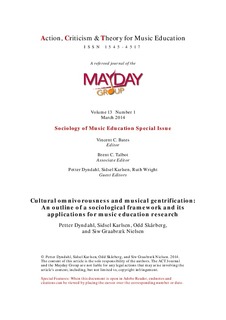Cultural omnivorousness and musical gentrification. An outline of a sociological framework and its applications for music education research
Journal article, Peer reviewed
Permanent lenke
http://hdl.handle.net/11250/230431Utgivelsesdato
2014Metadata
Vis full innførselSamlinger
Originalversjon
Dyndahl, P., Karlsen, S., Skårberg, O. S. & Nielsen, S. G. (2014). Cultural omnivorousness and musical gentrification: An outline of a sociological framework and its applications for music education research. Action, criticism, & theory for music education, 13(1), 40-69.Sammendrag
In this article, we aim to develop a theoretical model to understand what we refer
to as ‘musical gentrification’ and to explore how this model might be applied to and
inform music education research. We start from a Bourdieusian point of view,
elaborating on the connections between social class and cultural capital, and then
move on to discuss more recent contributions concerning cultural omnivorousness
and musical gentrification. Furthermore, we show, through describing an ongoing
research project, how the notion of musical gentrification can be utilised in music
education empirical research, and we also discuss its possible applications in future
efforts of mapping and understanding the present-day complexity of the culturalmusical
landscape.
Beskrivelse
This is an Open Access scientific, peer-reviewed article originally published in the journal Action, criticism, & theory for music education. The article can be accessed at the following location: http://act.maydaygroup.org/articles/DyndahlKarlsenSkårbergNielsen13_1.pdf
Utgiver
MayDay GroupTidsskrift
Action, criticism, & theory for music educationBeslektede innførsler
Viser innførsler beslektet ved tittel, forfatter og emneord.
-
Knowing music as representation or as operation: Exploring musical diversity through collaborative music making in Kaleidoscope
Kvaal, Camilla (Peer reviewed; Journal article, 2021)A society considered to be in a multicultural condition is likely to condition the way things are seen and what is seen as important. Attention is likely to be drawn to difference and diversity and the prospects of including ... -
Children's subject positions in discourses of music in everyday life: Rethinking conceptions of the child in and for music education.
Vestad, Ingeborg Lunde (Journal article; Peer reviewed, 2014)In this article I discuss children’s everyday uses of recorded music (such as CDs, Mp3-files) in the light of sociological notions of “children” and “childhood”. The discussion provides perspectives on musical engagement ... -
Pop Music for Kids: Sonic Markers as Narrative Strategies in Children’s Music
Askerøi, Eirik (Journal article; Peer reviewed, 2017)Whilst the creative handling of recording technology has played a major role in the development of popular music, there has been little research into the role of production in music promoted explicitly for a child audience. ...
